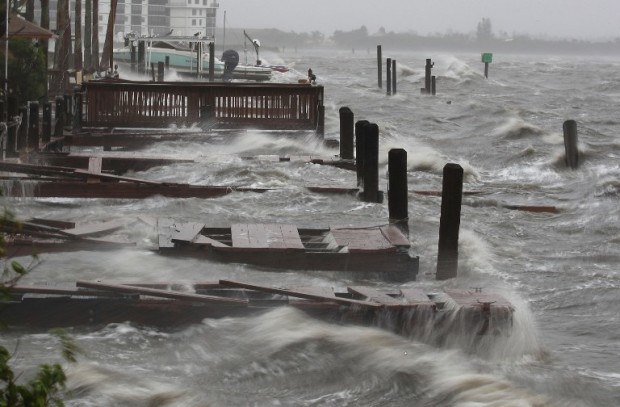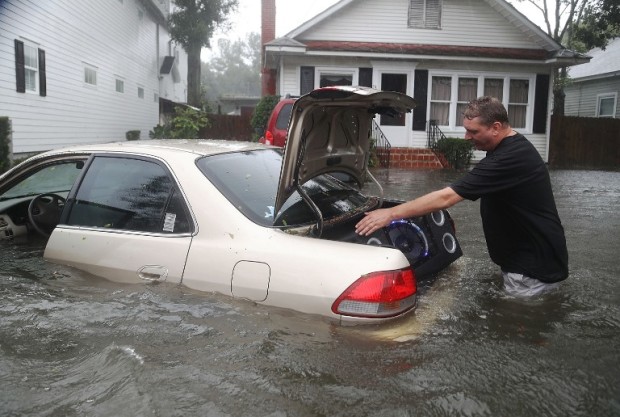Hurricane Matthew lashes Florida, Georgia, South Carolina

Heavy waves caused by Hurricane Matthew pound the boat docks at the Sunset Bar and Grill, October 7, 2016 on Cocoa Beach, Florida. Hurricane Matthew passed by offshore as a catagory 3 hurricane bringing heavy winds and minor flooding. Mark Wilson/Getty Images/AFP
JACKSONVILLE, United States – A weakened Hurricane Matthew churned just off the coast of the US states of Georgia and South Carolina Saturday, threatening deadly floods after leaving more than a million people without power in Florida and claiming five lives.
At 0600 GMT, Matthew — now a Category 2 system with top sustained winds of 165 kilometers per hour — was closing in on a stretch of coast near historic colonial-era cities of Charleston, South Carolina and Savannah, Georgia.
“There is a danger of life-threatening inundation during the next 36 hours along the Florida northeast coast, the Georgia coast, the South Carolina coast, and (part of) the North Carolina coast,” warned the National Hurricane Center in Miami. The storm was 70 kilometers south of Hilton Head, South Carolina.
Authorities in South Carolina ordered thousands to evacuate inland to shelters, where people sprawled out in school gyms.
Millions of Americans were subject to evacuation orders and curfews were slapped on cities as the lethal storm barreled north after killing at least 400 people in Haiti, and storming through Jamaica, Cuba, the Dominican Republic — where it left four dead — and the Bahamas.
READ: Horror in Haiti as hurricane toll soars
“The weather experts have described Matthew as a once in a 100-year type of storm,” said Mayor Lenny Curry in Jacksonville, Florida, home to 850,000 people — nearly half of whom had been evacuated.
“We want our citizens to be safe. Our focus throughout this event has been public safety.”
Matthew savaged Haiti as a ruinous Category Four hurricane, but weakened as it approached the US mainland, where emergency services were on lockdown and millions of people were urged to evacuate.
The NHC has warned that with torrential rains and storm surges of up to three meters, Matthew’s storm surge is capable of devastating damage.
“This is still a really dangerous hurricane,” said President Barack Obama. “The potential for storm surge, flooding, loss of life and severe property damage continues to exist.”
Obama has declared federal states of emergency in Florida, Georgia, and North and South Carolina. Authorities struck almost apocalyptic tones, with increasingly urgent warnings to evacuate coastal and low-lying areas, but many others heeded no intention, hunkering down at home.
‘Pray’
Torrential rain and strong winds lashed cities, bringing down trees, causing tall buildings to sway after night fell and turning normally bustling population centers into ghost towns.
At least five people died in Florida — two women killed by falling trees — a third woman from a heart attack and a couple killed by carbon monoxide as they ran a generator in their home’s garage.
Matthew damaged roofs at the Kennedy Space Center but spared Florida’s heavily populated south-central coast a direct hit. “The worst effects are still likely to come,” warned Governor Rick Scott, referring to expected flooding.
READ: Four dead in Florida from Hurricane Matthew
In St Augustine — a one-time Spanish colony that calls itself the nation’s oldest city — roads were deserted, many blocked by downed trees or flooded with ocean water and the city eerily empty under darkly menacing skies.
Mayor Nancy Shaver said up to half the population in vulnerable zones had refused to evacuate. Officials up and down the coast urged people to stay at home once the storm moved in.
Across the state, 1.1 million people were left without power, about 11 percent of customers, officials confirmed.
The center of Matthew passed northeast Florida and coastal Georgia overnight into Saturday before raking the South Carolina coast, weakening but retaining hurricane force until moving out to sea on Sunday, the NHC predicted.
Evacuation orders covered some three million residents, with cities like Jacksonville and Savannah, Georgia in the storm’s path.

Rob Birch salvages a speaker from the trunk of his car which floated out of his drive way as Hurricane Matthew passes through the area on October 7, 2016 in St Augustine, Florida. Florida, Georgia, South Carolina and North Carolina all declared a state of emergency in anticipation of Hurricane Matthew. Joe Raedle/Getty Images/AFP
Cities including Savannah and Charleston in South Carolina ordered dusk to dawn curfews to keep people off the streets and guard against looting.
“Pray,” Republican Congressman Buddy Carter, whose district includes the Georgia coast, told a news conference. “Pray that this storm moves offshore and doesn’t come in to harm anyone.”
‘Don’t want to die’
Matthew was expected to dump up to 14 inches of rain along the Georgia coast, where Governor Nathan Deal ordered six counties home to nearly a half-million people to evacuate.
The presidential candidates — Republican Donald Trump and Democrat Hillary Clinton — received briefings on the storm from homeland security and each offered messages of solidarity to those affected.
Around 2,200 vulnerable people, including the sick, the elderly and young families, were bused out of Savannah. Officials threatened to arrest anyone caught defying a night-time curfew.
“To save my life, I’d leave home anytime,” said Eugene Johnson, 40, a fork lift operator leaving with his 76-year-old father who recently suffered a stroke and has a heart condition.
“You gotta evacuate. If you stay, that’s like signing a death certificate. I don’t want to die, I’ve got to take care of my dad.”
The South Carolina Emergency Management Division tweeted that the situation was “DIRE for barrier islands” most exposed to the ocean.
South Carolina Governor Nikki Haley said the storm was “getting worse.” More than 300,000 of the 500,000 people in at-risk areas had been evacuated but that “was not enough.”
Some coastal islands, Haley added, “will be under water.”